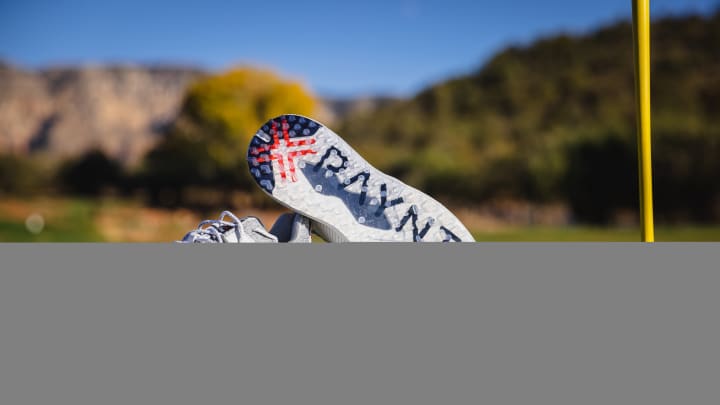How Payntr Golf Shoes Were Built From the Ground Up

Ever since Mike Forsey was a young boy, all he ever wanted to do was work in the footwear industry. Forsey’s footsteps to becoming co-owner of Payntr Golf can be traced along a path of nearly three decades in the industry.
Forsey, 58, has worked on engineering golf shoes for FootJoy, Reebok, Nike and Under Armour. At Nike and then Under Armour, he was instrumental in developing the first pair of golf shoes for Tiger Woods and Jordan Spieth, which became the prototypes for the golf shoe lines each company brought into the golf retail market.
In 2020, Forsey founded Payntr Golf Global — Payntr Golf’s parent company — with British cricket shoemaker David Paynter. Veteran golf shoe designer Michael Glancy joined as the company’s third partner in July.
Glancy brings to the trio another pedigree employment record, which includes eight years at Reebok designing cleated shoes for baseball, football, soccer, lacrosse, and track and field. He worked under Forsey at Under Armour, helping to launch that company’s golf shoe line.
Shoe the Latest Deals on Golf Shoes for Men | Golf Shoes for Women
Forsey explains Payntr Golf’s slogan, “Performance Multiplied,” by offering a stroll down golf shoe’s memory lane.
“Those heavy leather golf shoes with their long metal spikes worn by virtually all golfers, champions and amateurs alike right up through the 1980s, did provide a stable base for golfers to hit from,” he said. “But those heavy spikes also all but cemented golfers to the ground, and greatly inhibited their ability to make a quality, centered athletic pivot motion.
“What’s more, those shoes did little to help golfers utilize what’s called ‘ground reaction force,’ one of the holy grails of contemporary teaching philosophy, which involves golfers transferring energy up from the ground up and into the swings.”
Noted instructor David Leadbetter, who is an ambassador for Payntr Golf, echoes Forsey’s thought.
“Golf is all about harnessing energy, then storing or holding off that energy before releasing and unleashing it into the ball,” he said.
From the start, Payntr golf shoes were intended to becomea key part of a player’s selected golf equipment makeup, and were engineered with the golf swing’s biomechanics foremost in mind.
While the fully waterproof shoes are light and breathable and sport a contemporary, yet conservative, athletic look, it’s the shoes’ bottoms that ignite and carry out the golf swing’s dynamic work. That’s where a vigorous orchestration of soft cleats and firm, yet flexible, Thermoplastic Polyurethane nubs align themselves to provide what the company calls “three-dimentional traction in the vertical, horizontal and rotational directions.”
Therefore, the shoes help golfers grip the ground with their toes, while accommodating and accepting the lateral, rearward and forward weight shifts during the swing. The also provides golf-specific traction needed to pivot productively with weight centered and never over rotating or rolling to the outer edges of their feet.
Payntr’s Propulsion Plate stands as the shoe’s most innovative feature. A sculpted air chamber shaped like an elongated hourglass and lined with thin graphite, the plate fits recessed down into the heel-ward sections of each shoe.
The company claims that this flattens as a golfer applies pressure on it during the backswing. Then as a player pushes off the ground in the downswing, the plate expands and reflexes upward to harness that coveted ground reaction force that energizes the body and adds speed and power to the swing.
Glancy says that what is next for Payntr Golf shoes includes a small-nubbed, metal-spiked version geared to appeal to those Tour players who still wear such metal cleats, an expanded international distribution network, and the addition of new models to the Payntr Golf line. These will include a full-grain upper leather golf shoe, one featuring a dial/disc lace closure system as well as women’s and junior models.
Looking a bit further down that same footwear road he’s so successfully traveled on to this point, Mike Forsey says, “it’s our hope that Payntr Golf shoes will come to be considered the market’s leading performance-enhancing brand for the avid golfer.”
Disclaimer: All selections are independently chosen by our editorial team. If you buy a linked product, Morning Read and SI.com may earn a fee. Pricing may vary.
